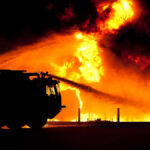Another and proceeding with justification : Sudan is encircled by unsteady countries. A compassionate emergency could bring about displaced people flooding into nations unprepared to deal with the emergency.

Sudanese people have experienced a lot.
They lived through a nearly 30-year dictatorship under President Omar al-Bashir, whose name became synonymous with war crimes committed in Darfur and brutal punishments handed down to those who disobeyed him.
When civilians finally gained sufficient momentum and support to overthrow him in 2019, Sudan — and the world — celebrated.
But this takeover was impeded by military involvement and was ultimately cut short by a military coup in October 2021, led by two powerful generals, Mohamed Hamdan Dagalo, known as Hemeti, and Abdel Fattah al-Burhan.
In April, Burhan and Hemeti began fighting for control over Africa’s third largest country.
Bombs and gunfire rung out throughout the Sudanese capital Khartoum as these men launched increasingly significant attacks on each other. More than 400 people have died in the violence so far and more than 100,000 have now fled, according to the United Nations High Commissioner for Refugees.
A humanitarian crisis as refugees flee
War in Sudan has broad geopolitical ramifications.
Bordering nations Chad, South Sudan and Central African Republic — all of which are unstable — are concerned that the war will spark a humanitarian crisis. None of these countries are equipped to deal with mass refugee inflows, which have already begun.
In the first days of the war, nearly 20,000 civilians fled into Chad, a country which has experienced an alleged coup attempt of its own in the past six months.
These states are also concerned that instability will spread over Sudan’s borders and destabilise their own countries. This is especially the case in Chad, where fears abound that Hemeti’s rising prominence might trigger unrest among his ethnic Arab allies in the country.
War could spread in an unstable region.
Egypt, Ethiopia and Libya are also watching events in Sudan closely.
Andrew Smith, head of Africa at political risk company Torchlight, said that Sudan is engaged in a long-running dispute with Egypt and Ethiopia over a major dam being built by Ethiopia on the River Nile. It is expected to have a significant impact on water and electricity supplies in all three countries, he said.
Meanwhile, Libya’s General Khalifa Haftar, who controls eastern Libya, has ties to Hemeti. Many of his forces have come from Darfur and Hemeti has previously sent fighters to support Haftar, suggesting that he may now repay the favour.
The broader instability in the region of which Sudan is a part — five of its seven neighbours have been embroiled in some form of insecurity in recent years — has elevated the importance of this outbreak of war further afield as well, raising eyebrows as far away as Russia, the United States and the UK.
“Sudan’s strategic location near key trade routes, and an abundance of mineral and agricultural wealth has attracted interest from world powers, including the West, Russia, China and Gulf nations,” Smith said.
If Sudan becomes seriously destabilised, this war could spread into neighbouring states and unsettle the entirety of the Sahel, the semi-arid stretch of desert that divides Sub-Saharan Africa from North Africa.
“Prolonged conflict in Sudan effectively means a whole belt of countries stretching from Mali in the Sahel to the Red Sea are unstable,” Smith said.
Superpowers hover as the situation devolves.
Global concerns over this instability are exacerbated by the existing alleged involvement of Russia in Sudan, where it has been eagerly pursuing access to a naval base at Port Sudan on the Red Sea. Hemeti also says that his fighters have been trained by operatives from the Wagner Group, a Russian paramilitary organisation currently fighting in Ukraine, and it is likely they will receive continued support from Moscow.
The attachment of Russia to Sudan could also lead to greater participation from the United States and other Western allies trying to reduce Russian influence around the world. Thus far the United States has been trying to orchestrate peace accords and mediation between the generals, but if the war drags on and Russian involvement becomes protracted, Washington will almost certainly seek to assist General Burhan.
This is particularly so given that Russia’s influence across Africa has increased exponentially in recent years, with Wagner now likely operating in more than five countries on the continent.
Meanwhile, Gulf states also have interests in Sudan.
Read This : Singapore: Singapore Hangs First Woman In 19 Years After She Was Convicted Of Trafficking 31 Grams Of Heroin
The United Arab Emirates and Saudi Arabia are thought to be close allies of Hemeti, whose own paramilitary group known as the Rapid Support Forces (RSF), have allegedly been used as mercenaries in support of the Gulf-led coalition against Houthi rebels in the war in Yemen.
Can peace have a chance?
The diversity of actors with an interest in the conflict makes it ripe for escalation, much like that seen in Syria, if it is not rapidly brought to a close. The longer the war continues, the more likely it is that external actors will begin to participate in the war: Chad has already been accused of involvement.
The opportunities for peace are rapidly diminishing. Mediators have called for ceasefires and peace negotiations, but these efforts are not bearing fruit.
Hemeti and Burhan have repeatedly committed to ceasefires since war broke out, only for those ceasefires to collapse shortly thereafter, with humanitarian organisations complaining that access to the population is proving extremely difficult while the fighting rages on.
The longer the crisis continues, the more likely it is that Hemeti and Burhan will entirely lose interest in peace, and instead seek to overpower one another on the battlefield.
“Neither side looks willing to de-escalate the situation,” Smith said. “Given the existing tensions between the two forces, the outright defeat or surrender of one side is the most appealing option to either of the two sides.”
The generals appear to be locked in a fight to the death. Both of them recognise that if they are on the losing side of the conflict, they stand to lose their wealth, power and status.
Unfortunately, the Sudanese population are likely to lose much more while they wait for peace.













